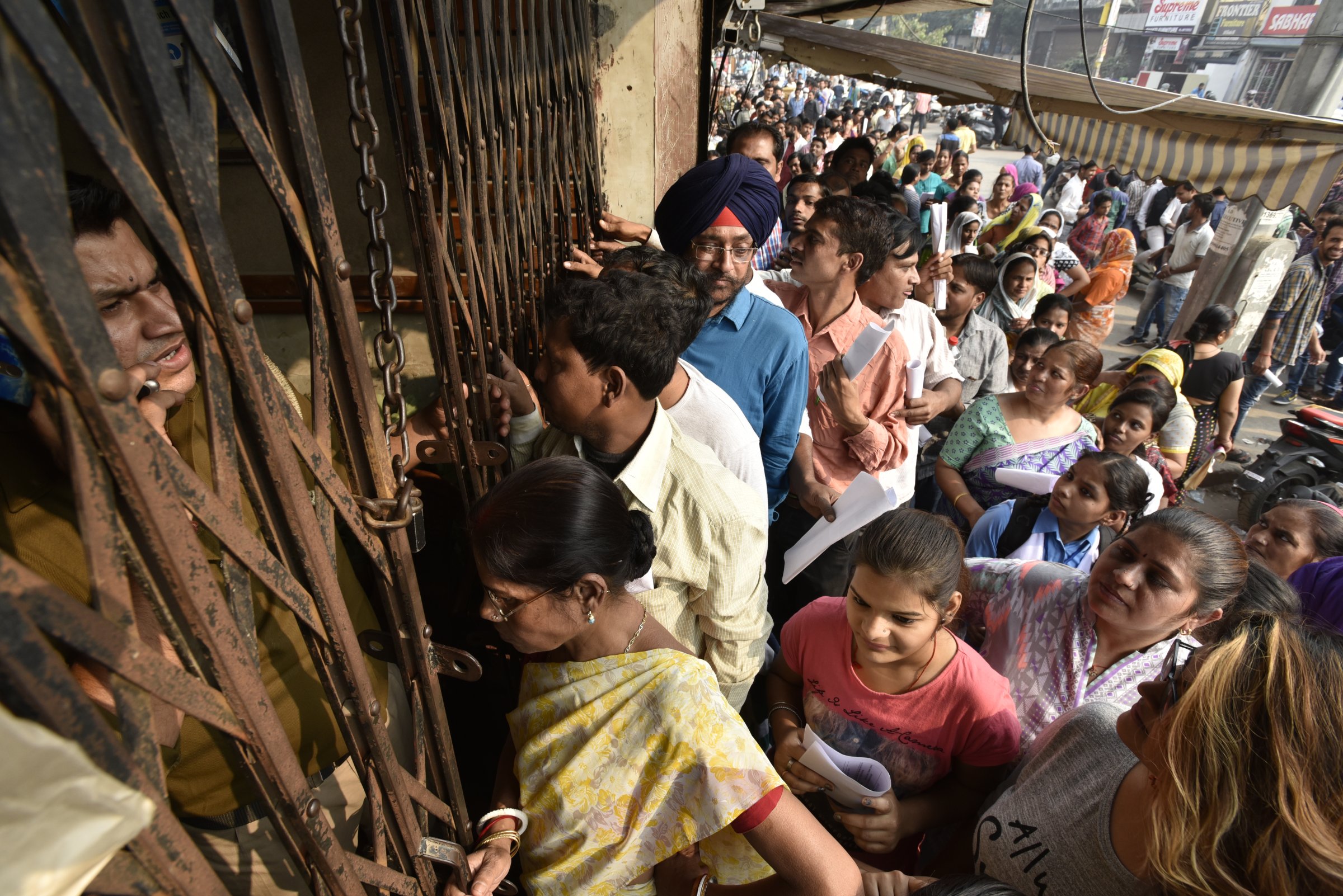
For Rishab, a young man in his 20s who works as a carpenter in New Delhi, the announcement could not have come at a worse time. On Tuesday evening, in an unscheduled television address, India’s Prime Minister Narendra Modi said the country’s two highest denomination currency notes — worth 500 and 1,000 Rupees (or roughly $7.5 and $15) respectively — would be rendered worthless within hours. The idea: to clampdown on hoarders of ill-gotten cash and currency counterfeiters, who, if they wanted to continue using their stockpiles of dirty cash, would have to go to the bank to convert their money. In doing so, they would end up under the government’s scanner.
New 500 and high-denomination 2000 Rupee notes would, Modi said, replace the old, easier to fake, cash. And in the meantime, ordinary Indians left with worthless paper in their wallets could, after a day’s holiday to allow banks to prepare for the change, head to their local branch to exchange or deposit the old money.
“I was paid for my last job on Monday,” says Rishab, who declined to give his second name. He had been doing some woodwork for a new family home, and like most Indians, he was paid in cash. Four days work yielded him an income of two thousand rupees. “It was all in 500 Rupee notes. I have money, but I can’t do anything with.”
Read More: India Scraps Larger Rupee Banknotes to Fight Corruption and Counterfeit Currency
He was talking while waiting, on Friday morning, in a long bank queue that had spilled out of a New Delhi branch and snaked around the block. It was his second day there: he had come on Thursday, the day banks reopened, but failed to exchange his old currency because of the rush at the branch. He does not have a credit card, nor does he have any money in his bank account, which he only opened last year amid a nationwide government campaign to open bank accounts for poorer Indians. “There’s nothing left at the end of the month,” he explains. He lives on cash — and the cash in his pocket is now worthless. Worse, waiting in line for two days, he says, means that he is not working on those days. He’ll have even less than usual left at the end of the month.
Rishab’s story is not unusual. Ever since Modi’s surprise announcement, ordinary Indians up and down the country have been scrambling to adjust to the changes. The currency notes affected by the new policy account for roughly 87% of all notes in circulation across India, which functions on cash. A 2015 Tufts University study found that less 10% of Indians had ever made payments with anything other than cash; the same report said the value of notes and coins as a proportion of India’s economic output, or GDP, was just over 12% — significantly higher than the likes of Brazil and South Africa, where it is under 4%.
Despite the disruption caused by its move, the government is hoping it helps reduce large stocks of unaccounted for wealth in India, which has long been blighted by widespread corruption and tax evasion. In fact, such is the scale of the problem, that India ranks as one of the world leaders when it comes to the export of illicit cash: in a 2013 report, Global Financial Integrity, a Washington-based nonprofit that tracks the flow of dirty money around the world, estimated that some $344 billion in unaccounted for funds had been siphoned off from the Indian economy between 2002 and 2011.
Questions remain about the long-term impact of the move. The most obvious worry is about what happens when the 1000 Rupee notes are replaced with the newer 2000 Rupee denominations, with critics saying that the step might only make it easier to stash illicit funds in the future.
Yet the public reaction appears, for now, to be largely positive. Despite long queues at banks and inconvenience caused, there is little sign of panic. Instead, many are hoping the gambit works. “Black money [as illicit funds are known in India] only benefits the rich,” says Rishab, as others around him in the bank queue nod in agreement. “This is good. Yes, it’s hard for us. But what else can the government do? I don’t mind waiting if it helps end corruption and the black money problem.”
More Must-Reads from TIME
- Cybersecurity Experts Are Sounding the Alarm on DOGE
- Meet the 2025 Women of the Year
- The Harsh Truth About Disability Inclusion
- Why Do More Young Adults Have Cancer?
- Colman Domingo Leads With Radical Love
- How to Get Better at Doing Things Alone
- Michelle Zauner Stares Down the Darkness
Contact us at letters@time.com